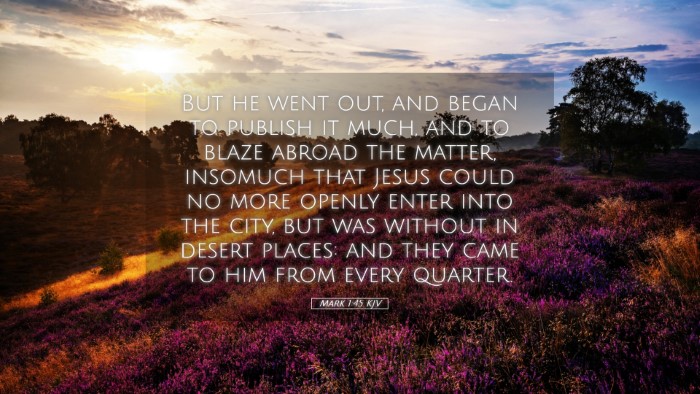Commentary on Mark 1:45
Verse Overview: Mark 1:45 states, "But he went out and began to talk freely about it and to spread the news, so that Jesus could no longer enter a town openly but stayed outside in lonely places. Yet the people still came to him from everywhere." This verse encapsulates the remarkable impact of Jesus's ministry, particularly following the healing of a leper, highlighting both the urgency of the man's proclamation and the resultant challenges faced by Christ.
Contextual Background
This passage occurs early in Jesus's ministry. The healing of the leper marks one of His first miracles as recorded by Mark, emphasizing Jesus’s authority over disease and His compassion towards those marginalized by society. The narrative gives insight into the developing fame of Jesus and the implications for His mission.
Commentary Insights
1. The Actions of the Healed Leper
Matthew Henry notes that the leper’s actions are indicative of a heart overwhelmed by gratitude. His eagerness to share the good news of his healing symbolizes the natural human response to divine grace. As Henry elucidates, 'A true understanding of Christ’s mercy compels us to tell others of His goodness.'
Albert Barnes comments that the healed leper's disobedience (as he was instructed to show himself to the priest) reveals a tension between personal experience and social expectations. Yet, his outspoken declaration serves as a testament to the transformative power of Jesus’s actions. Barnes states, 'The man could not contain his joy and the divine mandate was shadowed by human exhilaration.'
Adam Clarke draws attention to the intensity of the leper’s proclamation—a fervent desire to communicate his encounter with Jesus. He elaborates, 'This powerful testimony reflects the importance of personal evangelism, where individual transformation becomes the catalyst for communal faith.'
2. The Impact on Jesus's Ministry
Matthew Henry explains that as the news of Jesus’s healing spread, it created a paradox; while many were drawn to Him for healing, it resulted in Jesus having to withdraw from the public eye. 'The more glory He gained, the more He had to hid,' he writes, underscoring the challenges faced by Jesus in balancing His mission to heal with the logistics of maintaining His ministry.
Albert Barnes adds that this fame caused Jesus to retreat into solitary places, highlighting the loneliness associated with immense popularity. 'Popular acclaim can isolate,' Barnes warns, reminding leaders of the need for solitude and prayer to fuel their vocation.
Adam Clarke insists that the contrasting themes of publicity and privacy are essential. He suggests that Jesus’s withdrawal into less populated regions demonstrates not only strategic ministry but also a profound truth about the nature of discipleship—'There are times when the truth must be proclaimed, and moments when it requires profound solitude.'
3. Theological Implications
From a theological perspective, this verse raises significant questions regarding the nature of Jesus’s mission and His kingdom’s dynamics. Matthew Henry asserts that the spreading of news about Jesus illustrates the tension between divine authority and human response: 'Christ’s power to heal must lead to recognition of His power to save.'
Albert Barnes posits that the omnipresence of Jesus is further demonstrated by people coming from all directions to meet Him despite the challenges. 'He was a magnet of hope, drawing those in need, even as He sought solitude,' he suggests.
Adam Clarke emphasizes the eschatological significance of this verse: 'The narrative foreshadows how the message of Christ will spread across the nations, revealing a deep yearning for hope and restoration in a broken world.'
Mark 1:45 serves as a profound reminder of the interrelated nature of healing and proclamation in ministry. As pastors, scholars, and students of the Bible reflect on this passage, they are encouraged to consider the implications of their testimonies, the necessity for solitude, and the complexities of ministry in a noisy world. This verse not only recounts an event in Jesus’s life but also lays out the challenges and triumphs that accompany a genuine encounter with God.


